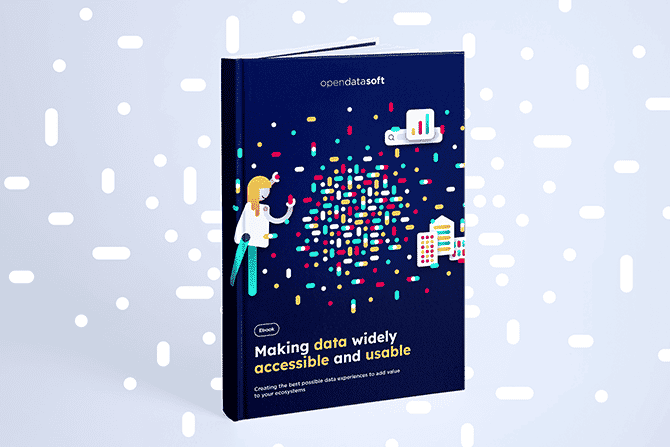Data for All: A Plea for Data Democratization
“Simple data access is no longer the heart of the matter. The game changer for businesses is to catch up to the speed of data sharing and exploitation.” -- Jean-Marc Lazard, CEO

In today’s world, no sector can afford to ignore the exponential growth of data. From smartphones to a myriad of Internet of Things (IoT) sensors, data is everywhere – and not always private. The plethora of collected raw data should be easily transformed into valuable information that serves everyone, without having to call on an expert.
Inadequate Data Exploitation
In order to translate into real value, data must be made available and easy to understand. When data is overly technical and confusing, it poses a challenge for people to access, and the democratization of data will be an impossible feat. But before achieving accessibility, data must first be readily available and easily locatable. Otherwise, it may remain an untapped resource for customers and a real loss of income for companies, while incurring a storage cost.
Until recently, public organizations and private businesses have not always been aware of the benefits of data sharing. Nevertheless, open data has repeatedly proved to be a source of innovation and economic development. Let’s take water meter data as an example. Initially, this data is used to indicate water consumption levels. However, by aggregating the data, we can analyze changes in consumption in real time, detect leaks, and allow building complexes to identify vacant apartments. And if we cross-reference this with other data, we can exponentially expand its potential uses. In an increasingly interconnected service economy, data must be shared and exchanged to improve business efficiency and provide customers with a seamless user experience.
The Many Benefits of Open Data
If we can optimize our use of data, concrete problems can be solved by quick and easy solutions. When data is made available to a wider range of audience like companies, industrial partners, and more broadly, the general public, we can unleash its full potential, inform decision making, and uncover new opportunities. With open data, you can make informed decisions based on real-time, contextualized information instead of relying on empirical expertise.
In the same way, open access to data can help companies build trust with clients and customers. Until recently, companies produced lengthy, and often convoluted annual reports to prove business performance. Today, open data has become a tangible tool to communicate with the outside world. In the future, the most successful companies will be those that quickly and efficiently adapt to a culture of data sharing, data visualizing, and data-driven decision making. The same goes for the public sector, such as local authorities and government agencies who have taken initiatives and created their own data portals ahead of the private sector.
Overcoming the Obstacles to Data Democratization
Private enterprises have only just started to take advantage of open data. When it comes to digital evolution, companies show a strong resistance and insecurity to change. In fact, the common misconception is to think that the use of data is out of reach and can only be used by tech companies or the IT department. Others have blindly put great efforts into developing new digital products without having a clear, strategic objective. However, to make the most of data exploitation, businesses need to have a mindset transformation at the leadership level. To successfully ride the waves of digitalization, companies need directions to get up to speed and to make a smooth transition.
Simple data access is no longer the heart of the matter. The game changer for businesses is to catch up to the speed of data sharing and exploitation. This also holds true for small and medium-sized companies. The most agile companies have introduced radical changes to their structures, taken initiatives to democratize data to all levels of the organization, and cashed in on their competitive advantage by enhancing their products, improving their services, and increasing their value through data.
Public demand for transparency is driving more and more data sharing initiatives. Businesses and organizations can gradually open to new ways of data sharing, capitalize on data insights, and lay foundations for digitalization.



